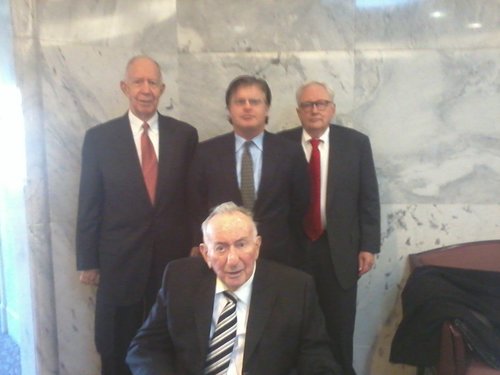Supreme Court Oral Arguments Held in Perry-Bolton TAD Case
(APN) ATLANTA — The Supreme Court of Georgia held oral arguments yesterday, Monday, January 07, 2013, in the appeal of the case challenging the bond validation for Atlanta’s Perry-Bolton Tax Allocation District (TAD).
The case is John Sherman and Christopher Eichler v. City of Atlanta, et al.
Irwin Stolz, Jr., a former Court of Appeals Judge in Georgia, argued for Sherman and Eichler. Lemuel Ward, Senior Assistant City Attorney, argued for the City of Atlanta and other parties, such as Fulton County and the Atlanta Development Authority.
The case is quite significant because should Sherman and Eichler prevail, not only would the Perry-Bolton TAD be in danger, but potentially all TADs across the State enacted before 2008.
A second case similarly concerning the Beltline TAD–Sherman v. Atlanta Independent School System et al.–is also pending before the Supreme Court of Georgia and is scheduled for oral argument on February 04, 2013.
As previously reported by the Atlanta Progressive News, the crux of the Perry-Bolton case [and the Beltline case] is whether the various resolutions, ordinances, and intergovernmental agreements contemplating the use of educational tax dollars for redevelopment purposes became null and void legal non-entities as a result of the Supreme Court of Georgia’s ruling in the 2008 Beltline case.
In the 2008 case, the Supreme Court ruled that the Beltline TAD was unconstitutional because the Georgia Constitution does not permit the use of educational tax dollars for redevelopment purposes.
This led the Georgia Legislature to amend the Georgia Constitution to purportedly allow such expenditures. Also, various City of Atlanta TAD legislation and agreements were also amended following the 2008 ruling in an attempt to allow them to go forward in an amended fashion.
However, Sherman and Eicher argue that entities that have become null and void from inception as a matter of law, cannot be amended. They argue that the City would have had to reenact new TADs. The reason the City probably did not want to enact new TADs is because property tax revenues are down, so there would be little or no funding for the TADs if the base year was after 2008.
“Which [TADs] weren’t redone?” Justice David Nahmias asked.
“All of them,” Stolz replied.
“The time of reference of an unconstitutional law is the date of passage. If it’s unconstitutional then, it’s forever void. An unconstitutional act is not a law, it cannot be saved by later statutory amendment. There’s nothing to amend,” Stolz argued.
Meanwhile, Ward argued that the 2008 ruling of the Supreme Court was narrow and that it thus did not impact any of the TAD legislation or agreements, something that at least one Justice did not seem to agree with.
“Justice Thompson’s ruling was so narrow,” Ward said.
“At the time the Woodham decision was handed down in 2008 no part of the Redevelopment Powers law had been held unconstitutional whatsoever. It did not invalidate the Redevelopment Powers law. It held that certain proposed funding violated the Educational Purpose Clause – no ordinance or intergovernmental agreement was specifically cited,” Ward said.
“Here all prior things in law that said you could use money for a TAD… were rendered unconstitutional by Woodham… they never existed,” Justice Nahmias said.
“I don’t think Woodham said that,” Ward said.
“When we say it’s unconstitutional to do something in a particular case… it’s not only unconstitutional in that case… It’s unconstitutional anywhere,” Nahmias said.
Among other things, Stolz also argued that the 2009 Constitutional Amendment did not, in fact, authorize the levy and use of educational tax dollars for redevelopment purposes, because it amended the Educational Purpose Clause by way of reference, instead of directly.
“The law does not favor amending or repealing by implication. If you want to amend, do it directly,” Stolz argued.
The 2009 Amendment instead amended the Redevelopment Powers Law, making reference to the Educational Purpose Clause, noting “notwithstanding the Educational Purpose Clause.”
“They’re trying to dodge indirectly what they did not want to do directly,” Stolz said.
“It’s too much. It’s too broad. It’s too uncertain. Constitutional amendments are basic and fundamental. They need to be done directly,” Stolz said.
“But they could’ve amended the Educational Purpose Clause,” Nahmias noted.
“People wouldn’t have bought it,” Stolz said, arguing that the 2009 ballot language was deceptive and misleading to voters in that voters did not know they were purportedly authorizing the expenditure of tax dollars for redevelopment purposes.
“Did you enumerate an error regarding ballot language?” Nahmias asked.
“Yes,” Stolz said.
In addition, the parties spent quite a bit of time arguing whether Sherman and Eichler had standing to challenge the TADs based on their residency.
After Stolz spent eight minutes on the subject, Nahmias told Stolz, “We can construe the [trial court] judge’s order,” to show residency.
“Please do, and then we can move on,” Stolz said, leading to some chuckling among the Justices and the audience.
The Perry-Bolton TAD is in Northwest Atlanta, in Councilwoman Felicia Moore’s district (District 9).
Ward acknowledged the potential impact of the case.
“If you had to reenact everything, if you had to start over…” Nahmias began.
“All TADs across the State would require a new referendum,” Ward said.
(END/2013)
